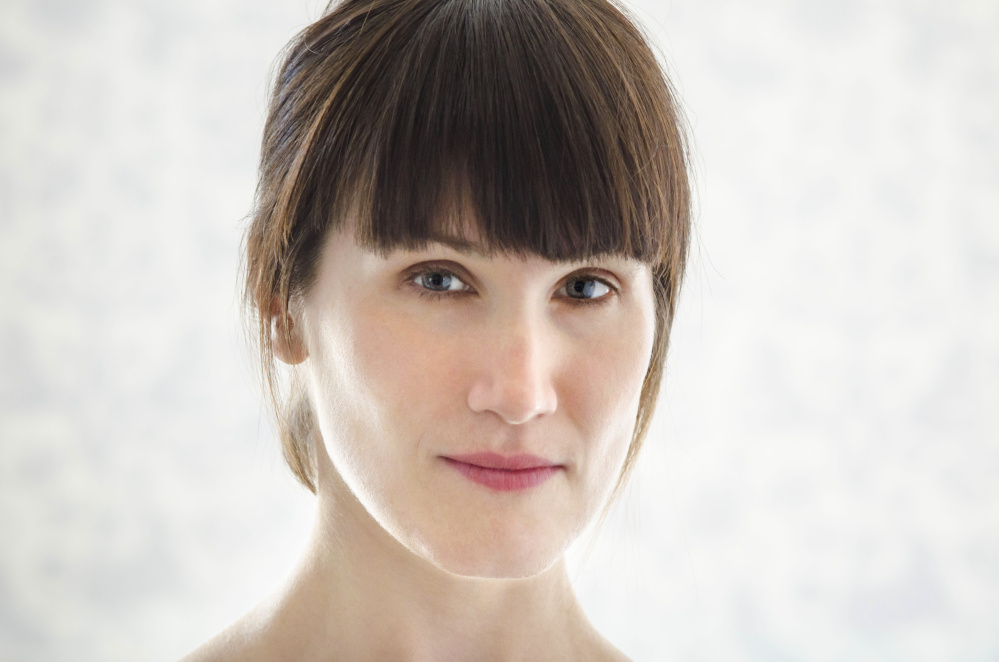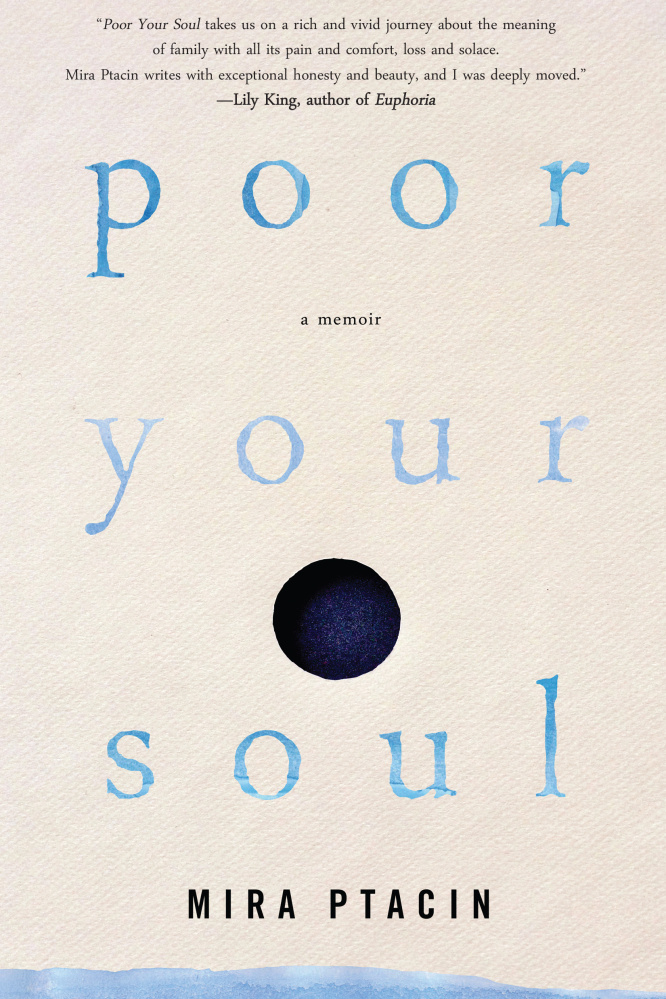If there is any upside to grief, Mira Ptacin gradually uncovers it in her moving and eloquent memoir, “Poor Your Soul.” At 28, the author became pregnant, only to learn that her baby was severely impaired and wouldn’t survive outside the womb. The choices that followed – to terminate, induce delivery or miscarry – challenged her to the core.
“The question isn’t: When will I stop grieving?” Ptacin writes in the book. “The question is: How do you keep on living?”
To her great relief, she comes to discover that life does indeed go on. Her self-scrutiny and the vivid accounts of her husband and parents portray a sturdy family, united in crisis.
Ptacin, who lives on Peaks Island, has written for numerous publications including New York Magazine and Guernica, and taught memoir writing at Salt Institute and the Maine Correctional Facility. She spoke recently about guilt, memoir and Oreos. This interview has been edited for length and clarity. (Note that, two weeks after this conversation, Ptacin gave birth to a healthy baby girl, Simone.)
Q: Your book is the best kind of political, meaning that it’s a raw human story.
A: I started writing this immediately after everything happened, at 28, when I was angry. Then for several years, I was editing it. I had to meditate on how events in my life connected. I had no outlet, no one I could relate to. All the 28-year-olds I knew were my friends in graduate school. To make it worse, I was in New York City. I felt so lonely.
The more I worked on the book, I realized that the publishing industry was really afraid of the word “abortion.” A lot of the rejections I got would say, “We don’t know how to market a book about abortion. It’s just too taboo at the moment,” so that kept me going.
Q: But abortion is really peripheral to the story. It’s about a life in crisis and how you dealt with that crisis.
A: Every single human has her own individual story that led to the choices she made. Seeing this book as just an individual’s story can change minds and develop empathy in readers, I hope. That’s my biggest goal – to develop empathy.
Q: You’ve talked about the importance of not generalizing about the lives of women who have an abortion. At 36, several years after the fact, do you think there’s only one right choice in the situation you were in?
A: I don’t think there’s one right choice. Now that I’m older, I think I would have been more receptive to help – to accepting help from people. I wanted to prove that I was really tough. When it happened, I felt embarrassed and guilty, and I wanted to prove that I was strong enough to deal with the consequences. I really wanted my family to believe in me and trust me.
Q: You clearly had a case of perfect daughter syndrome.
A: I know. I’m still working on it. That’s my vice – that, and Oreos!
I’m so glad I wrote the book when I did. I was feeling like I needed validation for the story. I needed some proof that it was all worth it. I was seeing a therapist, and she said that I should put the book in a box and move on. I said “okay,” but I lied. And instead I was just sending it out on my own.
Q: You’ve got a national book tour coming up over the next couple of months. After that, what’s on your docket?
A: I call my beat “the uterus and the American dream.” In my book, I was writing about one person’s reproductive story. I’m now working on another non-fiction book that’s more fun – a Maine-based story about a group of female clairvoyants and spiritualists.
I’m also teaching at a prison where I’m learning a lot about incarcerated women and their rights. I taught a weekly memoir class with 10 women in it, and it was the best teaching experience I’ve ever had. I was awakened to how unfair the criminal justice system is.
There are so many people whose lives started off unfairly and then something happened. It’s like my abortion story: There’s one turning point that changes your life. With these women, it was something illegal and now they’re in prison – some of them for a long time, some for life. So that’s one very big thing that’s part of my life now.
Q: It sounds like you went to teach and found yourself on the learning end.
A: It wasn’t like that at Salt Institute so much. I was always worried that these kids were going to realize that they were smarter than me. But teaching at the prison is like a gift. I feel grateful that these women let me into their lives.
Q: Safe to assume that writing your book has changed how you teach?
A: Yes, totally. When I was teaching at the prison, I carefully chose what we would read and write about. Of course, at the beginning, I was curious about why they’re in here. Four of the women had killed their husbands. One of my favorite students, who was the closest to my age, killed her daughter, a toddler. I felt such shock. It was so tragic. To have empathy, you have to put yourself in that person’s situation, and I just couldn’t imagine doing such a thing. I couldn’t figure out how to cope with my feelings. So I talked to my therapist about it, and she said, “Don’t ask her to write about it.”
Q: Because it would re-traumatize her?
A: Totally. So one of the things I did – and this is what I did with my book – was just to write around the big thing. I would give the women writing prompts: Write about the last time you wore a dress. Or write directions to your childhood home, stopping along the way and bringing up some memories that you have of the place. That’s the advice I was given when I was writing my book. Don’t just write about the abortion; you have to write about everything around it.
These women wrote such amazing things that showed who they were as people, besides the reason they’re in prison. It was so fascinating. I can see how “Orange Is The New Black” just took off!
Q: What is the biggest mistake that people make in writing memoirs?
A: There’s nothing new under the sun, and we have to realize that. There’s only a new way of telling a story and a new perspective. Anybody can write a memoir, but you can’t just say, “I have an interesting story that I need to write about.” It’s a craft. You don’t just sit down and start writing. Most of it’s done by thinking and reflecting and connecting the dots of your life, not just vomiting it on to the page. Luckily, it’s hard to get published. I think that’s a good thing.
I studied nonfiction in grad school. I did not want to write memoir. I was going to write about a crime that happened in my home town. Even after losing the baby, I was like, “I’m not going to write a memoir; I don’t want to navel-gaze.” But it had to be written. It just was too big.
Q: In the book, you start out talking about Maine almost from a retiree’s viewpoint. You talk about a sleepy life of acquiescence versus the kind of drive and intensity that you had in New York. Obviously, you’ve come full circle and returned to Maine.
A: I think I needed to go to New York to become a writer and to learn how the publishing industry works. New York just takes a lot of tenacity. It’s kind of crazy. I’m proud of my husband and me for being able to do that — to go, conquer whatever I could, set a limit and then leave. I know that I did not waste any time there. I gave it everything I had. And now I don’t feel guilty when I take a couple of days off. I still work hard here in Maine, but it’s more pleasurable.
Joan Silverman writes op-eds, essays and book reviews. Her work has appeared in The Christian Science Monitor, Chicago Tribune and Dallas Morning News.
Send questions/comments to the editors.




Comments are no longer available on this story